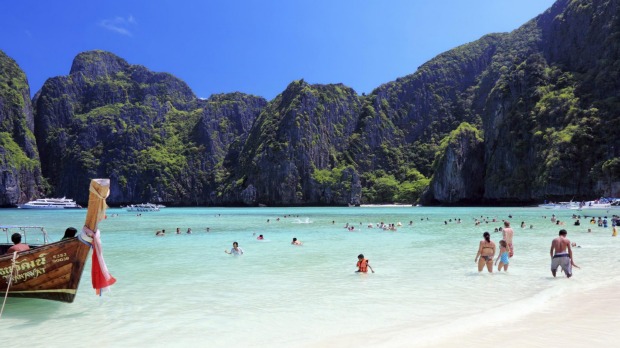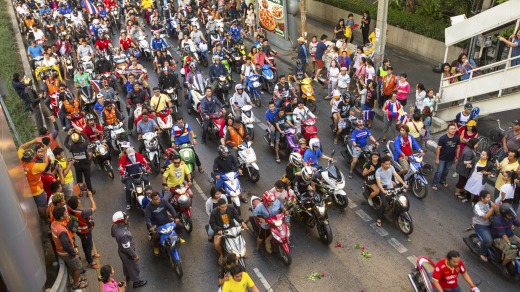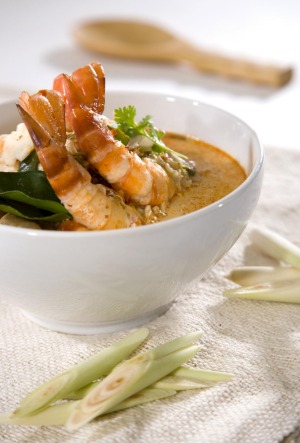
We know of its beaches, fiery food and dubious adult entertainment, but first-time visitors to Thailand will find surprises and quirks aplenty to spice up their tropical holiday. Here's what you'll discover if you look beyond the packaging:
Nearly 20 years after its release, The Beach - Alex Garland's novel about drug-fuelled misadventures in paradise - is still a bestseller in Thai airports, luring backpackers and Chinese tourists alike to the filming location of Ko Phi Phi. To step on fabled Maya Beach, however, you'll have to fork out 200 baht (A$7.75) before jostling for space with 100 boatloads of day trippers taking selfies. Forget about it…
..and head around the corner, where crystal waters and untouched sand is still yours for the taking. Leave the tourist trail, explore beyond the obvious, and you may just find that swinging hammock you've been dreaming about.

Three phone-wielding monks and a dog weaving through traffic astride a 50cc scooter might be an amusing sight, but Thailand has a horrifying road safety record, with 80 lives lost every day – the second highest number of traffic fatalities in the world. Unlicensed and drunk tourists only add to the statistics.
You may think you know Thai food … until you get to Thailand. Generally, local menus offer a broader selection, unusual combinations of ingredients and a much spicier palate. Wave chicken and cashews goodbye, and experiment with more adventurous choices.
Some Thai menus may not offer English translations or illustrative pictures – and it's these that you should approach with caution. There are some Thai dishes, for instance, that will leave delicate farang stomachs wrenching – such as Kai Yiew Ma (eggs preserved in horse urine), or Goong Ten (a live shrimp salad). Maybe stick to Pad Thai after all.

Every night, the footpaths of Bangkok's major thoroughfares become pop-up dining rooms as food vendors set up shop, complete with plastic tables, rickety stools and toilet-paper napkins. Do as the locals do and join the budget feast – guaranteed authenticity, as well as great theatre.
While beer sits alongside bottled water in every servo, 7-11 and supermarket, liquor sales can only officially be made between 11am-2pm, and from 5pm-midnight – so avoid getting thirsty during the afternoon.
Thank goodness most locals speak English. While it's polite to offer your khob khun kas and krabs, more ambitious attempts at the Thai language usually result in fits of giggles. The word 'ma', for instance, can mean dog, horse or come, depending on the tone.
Fortunately, the sight of dejected elephants begging for bananas in large cities is now rare, with most mahouts and their pachyderm charges seeking alternative employment in tourist camps. Finding an ethical sanctuary where elephants are treated with dignity and kindness, however, may involve travel off the beaten track to the north of Thailand.
Despite widespread acceptance of flesh-flaunting bikinis in appropriate settings (ie, the beach and by the pool), more modest attire is expected in public. Shoulders and knees must be covered to enter wats and palaces, with shawls and fishermen pants often made available for forgetful tourists.
Gotta love a country where rubber thongs are not only acceptable footwear, but by far the most practical choice! Since shoes are discarded inside every home, temple and many shops, it makes sense to wear something you can just slide on and off.
As peaceful and ever-smiling as Thais are, they take great delight in scaring the bejesus out of you by letting fireworks off at your feet, particularly during the annual Loi Kratong festival. They'll also happily soak you and your camera with impunity during the New Year celebrations of Songkran - be warned.
Thais have two obsessions – eating and shopping, preferably under one air-conditioned roof. There are at least 25 new malls under construction in Bangkok alone, adding to the already staggering list of multi-storied behemoths where food court meets Prada.
Thailand may not spring to mind when it comes to monuments, but its two ancient capitals of Ayutthaya and Sukhothai are compelling diversions, impeccably-maintained complexes of ruined temples and palaces that offer insights into Thailand's fractured foray into nationhood.
The Thais are a proud people, with great respect for king and country. The National Anthem is played publically every evening at 6pm, bringing activity to a one-minute halt; spot the tourist, wandering confused through stationary crowds, oblivious to protocol.
Coffee snobs rejoice – Thailand serves a halfway decent drop, with a burgeoning café culture and homegrown beans grown under Royal decree. Even in rural areas, there are chained coffee shops (or 'huts', as they are known) attached to gas stations, so you can get your caffeine fix on the run.
The party island of Ko Phangan often gets a bad rap, sullied (somewhat unfairly) by shenanigans during its monthly Full Moon Party that attracts up to 30,000 revellers. But why battle the crowds when most island destinations have their own full moon celebrations, more sedate beach parties that won't send your mum into a spin?
Many attractions and National Parks have two entry prices: one rate for Thais, and a far more expensive fee for farang. Even tax-paying foreigners with valid work permits aren't exempt from this blatant money-grubbing practice, justified as a lure for local visitors.
For me, a massage in Thailand means relaxation and ironing out the kinks; my male friends, however, speak of happier endings. According to them, this is not an infrequent offer in low-rent massage joints; to avoid temptation, opt for a fully-clothed Thai massage rather than an oil massage.
Yes, girlie bars abound in every major tourist destination; but if you employ the 'when in Rome' mantra and can't resist a peek, beware the innocent demeanour of pretty Thai ladies seeking your attention - they not be as friendly as they appear, or as female. Look beyond the packaging.
See also: The toughest way to reach Thailand's beaches
See also: The Bangkok hotel that's fit for a king